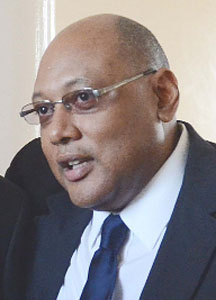Speaker of the National Assembly Raphael Trotman has moved to the Court of Appeal to challenge the ruling by Acting Chief Justice Ian Chang in the 2012 budget cuts case and is asking for the judgment to be reversed and/or set aside.
In the Notice of Appeal which was filed on February 25 by attorney at law Khemraj Ramjattan, it was stated that Trotman was dissatisfied with the entire decision, more particularly paragraph two, which was handed down on January 29, 2014.
Trotman was listed as the Appellant in the court documents while the Attorney General of Guyana is the respondent.
Six grounds of appeal were listed in the court documents.
The first ground is that the judge erred when he ruled that the National Assembly and its Committee of Supply do not have legal and constitutional authority to amend or reduce the Estimates of Revenues and Expenditure of Guyana for any given year.

The second ground is that the judge erred when he ruled that Standing Orders, or rules of procedure of the National Assembly, which provide for the amendment and reduction of the Estimates of Revenues and Expenditure of Guyana are not procedural rules of law, nor are they written law, nor are they subsidiary legislation, within the meaning of the Interpretation and General Clauses Act such as can impact upon or have a significance on the purposeful construction of article 218 of the Constitution.
The third ground is that the judge wrongly construed Articles 218 and 171 (2) (a) and (b) of the Constitution of Guyana thereby resulting in a construction that effectively ousted the National Assembly’s right and power to amend or reduce the Estimates of Revenues and Expenditure of Guyana for the purpose of charging the said Estimates to the Consolidated Fund. The judge, instead, ought to have properly and purposefully construed the said articles ensuring a construction thereof which would have resulted in the National Assembly possessing that ‘incidental’ power and right to amend or reduce the said Estimates in accordance with the text and context of the Constitution of Guyana.
The fourth ground is that the judge erred and overreached when he ruled that the amendment and reduction of the Estimates of Revenues and Expenditure of Guyana for the year 2012 by the National Assembly through its Committee of Supply, was an abrogation of the doctrine of separation of powers, and hence unconstitutional, unlawful and void, because the National Assembly by such reduction and amendment was encroaching on the function of the Executive as exercised by the Minister of Finance.
The fifth ground is that the judge erred when, consequent upon his finding that the Committee of Supply of the National Assembly acted unconstitutionally and unlawfully in amending and reducing the Estimates of the Revenues and Expenditure of Guyana for year 2012, he ruled that the Minister of Finance was at liberty to make advances/withdrawals from the Contingencies Fund pursuant to Article 220 of the Constitution for the purpose of restoring the funds as originally budgeted for in the said Estimates of 2012.
The sixth ground is that the judge erred and overreached when he ruled that the Court has a supervisory jurisdiction over the National Assembly and its Committee of Supply when the said National Assembly and its Committee of Supply proceeds upon the process of considering and deciding on the Estimates of Revenues and Expenditure and, thereafter, charging those said Estimates to the Consolidated Fund.

According to the court documents, the persons who would be directly affected by the appeal are Trotman, Nandlall, Minister of Finance, Ashni Singh and Leader of the Opposition, David Granger.
In June of 2012, Nandlall moved to the court to seek relief after APNU and the AFC, using their combined one-seat majority in the National Assembly, moved to reduce the estimates by $21 billion. Similar cuts were effected last year. The opposition had cited a lack of transparency and accountability in the explanations for the cuts to the allocations.
Although President Donald Ramotar later assented to the budget appropriations bill passed by the National Assembly, Nandlall subsequently moved to the courts to reverse the cuts.
On June 19 last year, Justice Chang struck out Granger and the Finance Minister as defendants in the 2012 budget cuts case on the ground that they are parliamentarians and can’t be sued. This resulted in Trotman being the sole defendant.
Granger has since taken steps in the court to challenge that exclusion.
According to Justice Chang in his decision, while the Assembly may approve or not approve the Finance Minister’s estimates of expenditure, it has no power to change them by either reducing or increasing them. “The power to amend may involve the power to approve.
But a power to approve does not imply a power to amend,” he wrote in his decision on a challenge to the cuts that was brought to the court by Nandlall.
It is the executive Minister’s estimates and it is he who must amend them to obtain the Assembly’s approval so that the Cabinet may recommend or consent to the presentation of an Appropriation Bill to the Assembly for passing for the purpose of charging those estimates to the Consolidated Fund, Justice Chang found. It appears that only the Constitution itself and not even Parliament, much less the Assembly, he added, can authorise the Assembly to amend the estimates of the executive minister. And despite arguments to the contrary, he said the Standing Orders, being mere internal regulatory rules, cannot do so.
Justice Chang said the very fact that the Constitution has provided for the approval and, by implication, non-approval of the minister’s estimates of expenditure by the Assembly in Article 218, leads to the “irresistible conclusion” that approval cannot be interpreted to mean “to amend.” It would not make sense for the Constitution to require the Assembly to approve that which it has itself amended, he explained.
“In the circumstances, the court sees it fit to declare that the National Assembly through the committee of supply has acted unlawfully and unconstitutionally in purporting to reduce or cut the Estimates of Expenditure of the Minister of Finance for the financial year 2012,” he wrote.
“The court sees it fit to further declare that the power of the National Assembly is limited to giving or withholding its approval for the Minister’s Estimates when those estimates are laid before the Assembly for its approval under Article 218 of the Constitution,” Justice Chang added.
Justice Chang’s decision was severely criticized by the opposition, non-government groups and commentators.





